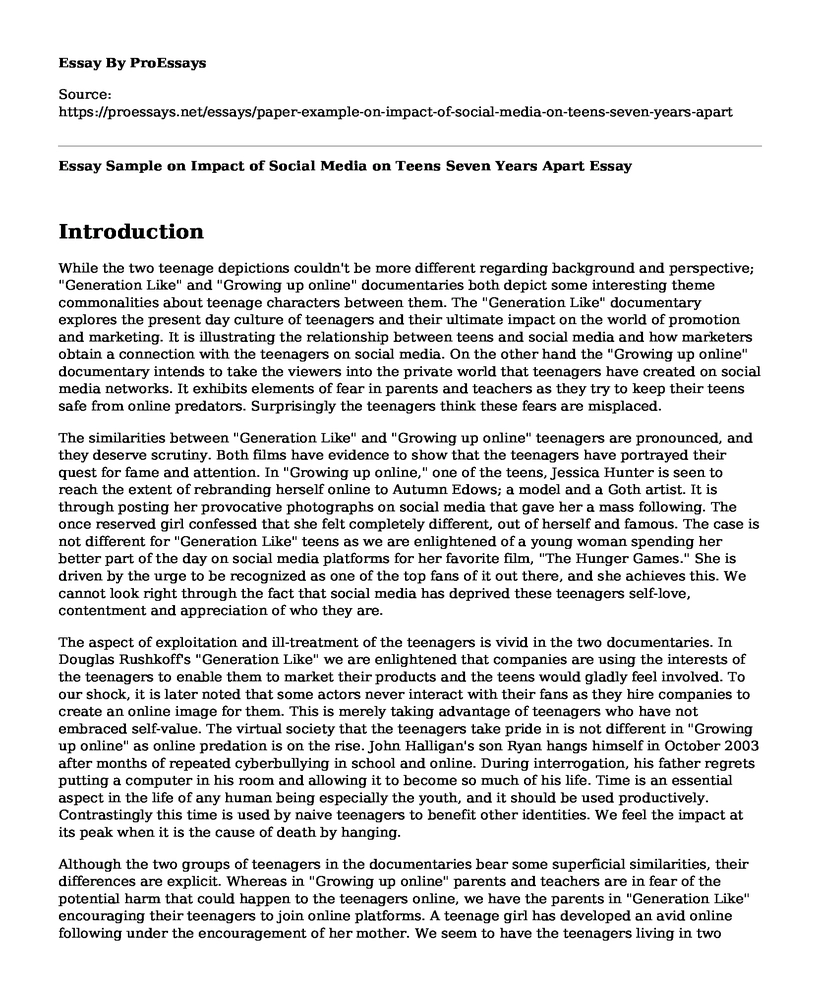Introduction
While the two teenage depictions couldn't be more different regarding background and perspective; "Generation Like" and "Growing up online" documentaries both depict some interesting theme commonalities about teenage characters between them. The "Generation Like" documentary explores the present day culture of teenagers and their ultimate impact on the world of promotion and marketing. It is illustrating the relationship between teens and social media and how marketers obtain a connection with the teenagers on social media. On the other hand the "Growing up online" documentary intends to take the viewers into the private world that teenagers have created on social media networks. It exhibits elements of fear in parents and teachers as they try to keep their teens safe from online predators. Surprisingly the teenagers think these fears are misplaced.
The similarities between "Generation Like" and "Growing up online" teenagers are pronounced, and they deserve scrutiny. Both films have evidence to show that the teenagers have portrayed their quest for fame and attention. In "Growing up online," one of the teens, Jessica Hunter is seen to reach the extent of rebranding herself online to Autumn Edows; a model and a Goth artist. It is through posting her provocative photographs on social media that gave her a mass following. The once reserved girl confessed that she felt completely different, out of herself and famous. The case is not different for "Generation Like" teens as we are enlightened of a young woman spending her better part of the day on social media platforms for her favorite film, "The Hunger Games." She is driven by the urge to be recognized as one of the top fans of it out there, and she achieves this. We cannot look right through the fact that social media has deprived these teenagers self-love, contentment and appreciation of who they are.
The aspect of exploitation and ill-treatment of the teenagers is vivid in the two documentaries. In Douglas Rushkoff's "Generation Like" we are enlightened that companies are using the interests of the teenagers to enable them to market their products and the teens would gladly feel involved. To our shock, it is later noted that some actors never interact with their fans as they hire companies to create an online image for them. This is merely taking advantage of teenagers who have not embraced self-value. The virtual society that the teenagers take pride in is not different in "Growing up online" as online predation is on the rise. John Halligan's son Ryan hangs himself in October 2003 after months of repeated cyberbullying in school and online. During interrogation, his father regrets putting a computer in his room and allowing it to become so much of his life. Time is an essential aspect in the life of any human being especially the youth, and it should be used productively. Contrastingly this time is used by naive teenagers to benefit other identities. We feel the impact at its peak when it is the cause of death by hanging.
Although the two groups of teenagers in the documentaries bear some superficial similarities, their differences are explicit. Whereas in "Growing up online" parents and teachers are in fear of the potential harm that could happen to the teenagers online, we have the parents in "Generation Like" encouraging their teenagers to join online platforms. A teenage girl has developed an avid online following under the encouragement of her mother. We seem to have the teenagers living in two completely different types of societies. Present day societal impacts of social media manifest themselves in the form of unethical videos and pictures, unwanted messages, anti-religious posts and links among people causing discord.
Conclusion
In conclusion, it is certainly evident that social media has become an area of interest to be voiced in the society. Impacts of social media on the teenagers from both films include time wastage which has rendered them unproductive in their real-life surroundings, detachment from the real world and living in self-denial. Although social media has got its merits, its demerits cannot be ignored.
Cite this page
Essay Sample on Impact of Social Media on Teens Seven Years Apart. (2022, Oct 19). Retrieved from https://proessays.net/essays/paper-example-on-impact-of-social-media-on-teens-seven-years-apart
If you are the original author of this essay and no longer wish to have it published on the ProEssays website, please click below to request its removal:
- Paper Example on Importance of Symbolism in the Modern Day
- My Experience With Social Media Addition - Essay Sample
- Transfer Admissions Essay: 2D Designer
- Film Analysis Essay on Eat Drink Man Woman and the God of Cookery
- Love Story for Tongming Xue
- Essay Example on Street Art: Social Messages Through Paint, Yarn and Stickers
- Paper Example on Theater as a Medium for Change: Amy Fritsche's Insight







